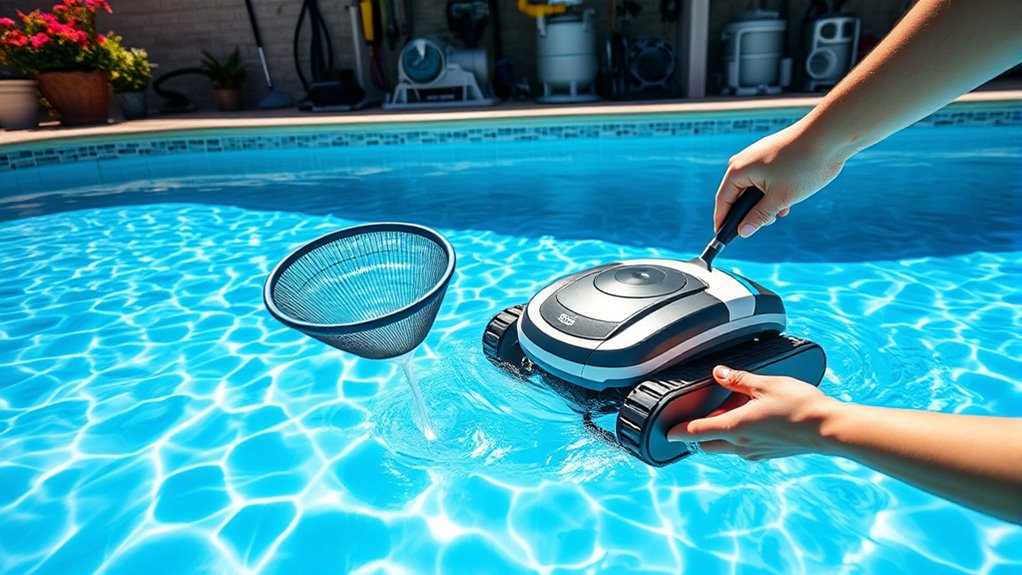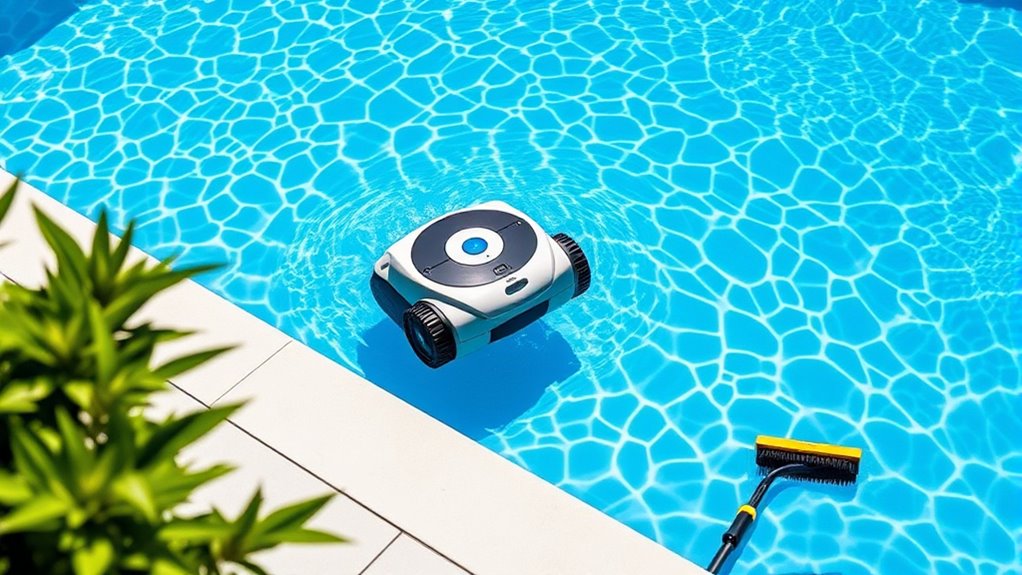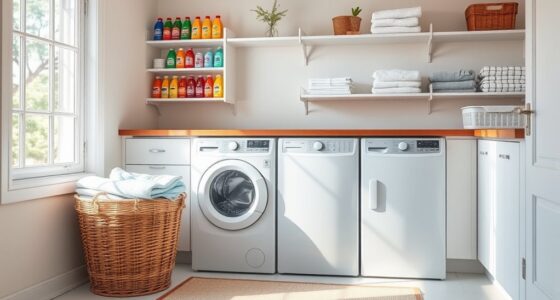To create the ultimate pool cleaning schedule, you should balance automatic systems like robotic cleaners and filters with manual tasks such as skimming, brushing, and water testing. Check chemical levels daily, run pumps regularly, and scrub walls weekly. Inspect equipment and adjust routines seasonally for peak results. Combining these approaches keeps your water clear and healthy. If you want to master every step, there’s plenty more to discover in the detailed tips ahead.
Key Takeaways
- Develop a weekly schedule that combines daily chemical checks, automatic filter runs, and manual cleaning tasks.
- Use automatic cleaners for routine debris removal, supplemented by manual scrubbing and inspection weekly.
- Balance filter maintenance by scheduling regular backwashing and cleaning alongside automatic system operation.
- Adjust cleaning frequency seasonally, increasing manual care during off-peak times or after storms.
- Incorporate smart technology and professional services for optimal maintenance management and water clarity.
Assessing Your Pool’s Needs and Setting Up Equipment

Before you begin cleaning your pool regularly, it’s important to assess its specific needs and set up the right equipment. Start by inspecting your pool’s size, shape, and usage patterns to determine the appropriate filtration system. Regular filter maintenance is essential for keeping the water clear and clean, so establish a schedule for cleaning or replacing the filter as needed. Next, focus on chemical balancing; test your water frequently to ensure proper pH, alkalinity, and sanitizer levels. Proper chemical balance prevents algae growth and bacteria, reducing the workload on your filter. Additionally, staying informed about local building codes and permits and innovative materials can inspire you to incorporate new equipment or accessories that enhance your pool experience. Incorporating portable cleaning tools like robotic cleaners or manual skimmers can also significantly reduce your pool maintenance effort. Using smart technology to monitor water quality can further optimize your maintenance routine, ensuring your pool remains pristine with less effort. Regularly checking and maintaining your automatic cleaning devices helps ensure they operate efficiently and extend their lifespan. Setting up the right equipment and understanding your pool’s unique requirements will make ongoing cleaning more effective and less labor-intensive, helping you maintain a pristine swimming environment.
Daily Maintenance Tasks to Keep Water Clear

To keep your pool water crystal clear, you need to perform daily maintenance tasks that address common issues before they become problems. Check the pool’s chemical balance daily, ensuring pH levels stay between 7.2 and 7.6, and adjust the chlorine to prevent bacteria growth. Proper chemical balance is key to algae prevention, which can quickly turn cloudy water green. Skim the surface for debris, leaves, and bugs, removing anything that might clog filters or affect water quality. Run your pool’s pump and filter for a few hours each day to circulate and filter out contaminants efficiently. Regularly monitoring these tasks helps maintain water clarity, reduces algae buildup, and keeps your pool safe and inviting for swimmers. Maintaining proper water circulation is essential for optimal filtration and overall water quality. Additionally, inspecting and cleaning your filter system regularly ensures it functions effectively and prolongs its lifespan. Incorporating professional maintenance tips can further enhance your pool’s cleanliness and performance, especially when combined with automatic cleaning devices that help reduce manual effort.
Weekly Deep Cleaning and Manual Care

Weekly deep cleaning and manual care are essential to keep your pool in top condition and prevent long-term issues. During this routine, you’ll scrub the walls and floor to remove buildup that automatic cleaners might miss. Check the chemical balance, adjusting pH and chlorine levels as needed to maintain safe, clear water. Proper chemical balance also helps prevent algae growth, which can quickly turn your pool green and uninviting. Use a brush and net to remove debris and algae, ensuring your pool stays pristine. Additionally, clean the skimmer and pump baskets to keep filtration running smoothly. These manual efforts complement your automatic systems, helping to extend their lifespan while keeping your pool safe, clean, and inviting all season long. To further enhance your pool maintenance, consider incorporating self watering planters to keep your surrounding garden thriving and visually appealing. Regular inspection of filtration systems can also improve overall cleaning efficiency and water quality, ensuring optimal water circulation and clarity.
Troubleshooting Common Issues and Adjusting Your Routine

Even with a well-maintained pool, issues can still arise that disrupt your water clarity and equipment performance. If you notice cloudiness, algae growth, or pH imbalances, it’s time to troubleshoot. Check your chemical balance first—imbalanced chemicals can lead to algae growth and cloudy water. Adjust pH, alkalinity, and sanitizer levels as needed. If algae appears despite proper chemical levels, increase chlorine or add an algae preventer. Regularly inspect your filter and pump, ensuring they’re functioning correctly. Sometimes, algae can cling to surfaces or clog filters, so cleaning and backwashing are essential. Additionally, HEPA filtration can assist in early detection of equipment issues or water quality problems. Using a monitoring device can help you keep an eye on water conditions in real-time. Paying attention to water circulation is crucial, as stagnant areas can promote algae and bacterial growth. Proper chemical management is vital for maintaining water clarity and preventing issues before they escalate. By staying vigilant and adjusting your routine based on these issues, you’ll keep your pool crystal-clear and prevent future problems.
Seasonal Tips for Year-Round Pool Maintenance

Maintaining your pool year-round requires adjusting your routine to changing seasons, ensuring ideal water quality and equipment longevity. In winter, focus on proper winter preparation by lowering water levels if necessary and running your pump less frequently. Regularly brush and skim to prevent debris buildup. To prevent algae growth during colder months, keep your pool covered when not in use and maintain proper chemical balance, especially chlorine levels. Algae prevention is vital, so consider adding algaecide before winter begins. As temperatures drop, monitor water chemistry closely to avoid issues like scaling or cloudy water. Additionally, being aware of automation technologies can help you better manage your pool maintenance with smart systems that simplify routine tasks. Incorporating remote monitoring can also enable you to keep an eye on your pool’s condition from anywhere, ensuring prompt adjustments when needed. Using advanced filtration systems can further improve water clarity and reduce chemical usage, making maintenance easier. Leveraging pool automation can streamline scheduling and notifications, saving you time and effort. Enlisting professional pool services can also ensure that your pool remains in optimal condition during off-season periods. By staying proactive with seasonal adjustments, you’ll protect your pool and make spring startup smoother, ensuring your pool stays clean, clear, and inviting year-round.
Frequently Asked Questions
How Do I Choose Between Automatic and Manual Cleaning Tools?
When choosing between automatic and manual cleaning tools, consider your pool’s size and debris level. Robotic vacuums are great for regular, hands-free cleaning, saving you time. However, manual skimming is essential for quick removal of surface leaves and insects, especially after storms. Combining both methods ensures a thorough clean, keeps your pool pristine, and reduces maintenance effort over time. Balance automated and manual tools based on your pool’s specific needs.
What Are Signs My Pool Needs More Manual Cleaning?
If your pool shows cloudy water, algae growth, or debris accumulation despite automatic cleaning, it’s time for more manual cleaning. Check your pool chemical balance regularly, as imbalances can cause issues, and inspect your pool equipment for maintenance needs. Skimming, brushing, and vacuuming help remove stubborn dirt and algae, ensuring your pool stays crystal clear. Regular manual cleaning complements automatic tools and keeps your pool in top condition.
How Often Should Filter Media Be Replaced?
Think of your filter media like the heart of your pool’s circulation system—if it’s clogged or worn out, everything slows down. You should replace filter media every 6 to 12 months, depending on use and water quality. Regular filter media replacement keeps pool circulation ideal, preventing debris buildup and ensuring clear, sparkling water. Don’t wait until your pool feels sluggish; timely changes keep your pool in perfect shape.
Can I Use Automatic Cleaners in Saltwater Pools?
Yes, you can use automatic cleaners in saltwater pools. Just guarantee your pool’s chemical balance is maintained, especially the salt and pH levels, to prevent corrosion. Regular pool equipment maintenance is essential to keep your automatic cleaner functioning well. Choose a cleaner compatible with saltwater, and follow manufacturer instructions to avoid damage, ensuring your pool stays clean and balanced without hassle.
What Safety Precautions Should I Follow During Manual Cleaning?
Did you know that improper pool cleaning can cause accidents? When cleaning manually, always prioritize pool chemical safety by handling chemicals with care and wearing gloves. Follow electrical safety tips by unplugging and turning off power sources before working on pumps or filters. Use non-slip mats to prevent falls, and verify tools are in good condition. These precautions help keep you safe while maintaining a sparkling, healthy pool.
Conclusion
Maintaining your pool doesn’t have to be overwhelming. By balancing automatic systems with manual care, you can keep your water crystal clear and inviting. Did you know that regular maintenance can extend your pool’s lifespan by up to 20%? Staying consistent with your schedule ensures you’re enjoying a invigorating, clean pool all season long. With a little effort, you’ll create a revitalizing oasis that’s easy to care for year-round.










